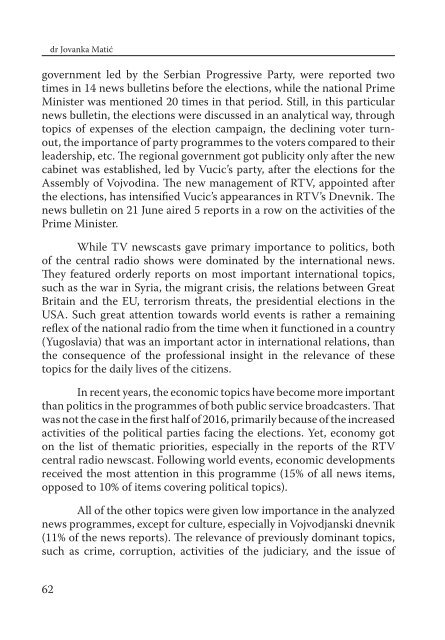You also want an ePaper? Increase the reach of your titles
YUMPU automatically turns print PDFs into web optimized ePapers that Google loves.
dr Jovanka Matić<br />
government led by the Serbian Progressive Party, were reported two<br />
times in 14 news bulletins before the elections, while the national Prime<br />
Minister was mentioned 20 times in that period. Still, in this particular<br />
news bulletin, the elections were discussed in an analytical way, through<br />
topics of expenses of the election campaign, the declining voter turnout,<br />
the importance of party programmes to the voters compared to their<br />
leadership, etc. The regional government got publicity only after the new<br />
cabinet was established, led by Vucic’s party, after the elections for the<br />
Assembly of Vojvodina. The new management of RTV, appointed after<br />
the elections, has intensified Vucic’s appearances in RTV’s Dnevnik. The<br />
news bulletin on 21 June aired 5 reports in a row on the activities of the<br />
Prime Minister.<br />
While TV newscasts gave primary importance to politics, both<br />
of the central radio shows were dominated by the international news.<br />
They featured orderly reports on most important international topics,<br />
such as the war in Syria, the migrant crisis, the relations between Great<br />
Britain and the EU, terrorism threats, the presidential elections in the<br />
USA. Such great attention towards world events is rather a remaining<br />
reflex of the national radio from the time when it functioned in a country<br />
(Yugoslavia) that was an important actor in international relations, than<br />
the consequence of the professional insight in the relevance of these<br />
topics for the daily lives of the citizens.<br />
In recent years, the economic topics have become more important<br />
than politics in the programmes of both public service broadcasters. That<br />
was not the case in the first half of 2016, primarily because of the increased<br />
activities of the political parties facing the elections. Yet, economy got<br />
on the list of thematic priorities, especially in the reports of the RTV<br />
central radio newscast. Following world events, economic developments<br />
received the most attention in this programme (15% of all news items,<br />
opposed to 10% of items covering political topics).<br />
All of the other topics were given low importance in the analyzed<br />
news programmes, except for culture, especially in Vojvodjanski dnevnik<br />
(11% of the news reports). The relevance of previously dominant topics,<br />
such as crime, corruption, activities of the judiciary, and the issue of<br />
NEWS AND INFORMATION PROGRAMMING OF THE SERBIAN NATIONAL AND<br />
VOJVODINA REGIONAL PUBLIC SERVICE BROADCASTERS (RTS AND RTV)<br />
Kosovo (everything related to events in Kosovo and political negotiations<br />
concerning Kosovo was sorted under this topic), had declined notably.<br />
Both of these topics were covered in 1% to 3% of the reports.<br />
Despite the fact that they discussed different topics, the central<br />
news bulletins of RTS and RTV offered a scarce picture of reality. The<br />
journalistic selection included just glimpses of reality, while neglecting<br />
the issues that burden the everyday lives of citizens the most. The daily<br />
reviews of the most important events of the day provided the stories<br />
about Resavica miners giving up on strike, about the preparation of the<br />
Law on Public Enterprises, about the funding of new workplaces from<br />
the state budget, successful negotiations with IMF, the issue of political<br />
influence on employment. There were no news stories about the life<br />
standards, about the economic rating of Serbia in comparison to other<br />
countries in the region, about the unemployed, about price increases,<br />
etc. The problems with the healthcare system, the rising trend of young<br />
adults leaving the country, the spread of corruption, were all neglected.<br />
All of the primetime newscasts marginalized the controversial topics or<br />
controversial aspects of the covered topics. From a huge number of reports<br />
about politics in RTS’s Dnevnik only one covered regional elections, the<br />
only one held, whose results were uncertain. This news bulletin never<br />
mentioned the civil protest “Ne da(vi)mo Beograd (Don’t let Belgrade<br />
d(r)own)”, about the reasons of cancelling the Prime Minister’s visit to<br />
the USA, etc. One could learn of political divisions in the country only<br />
from the news on election campaigning that presented activities of both<br />
the ruling and opposition parties. Even though the citizens gained a lot of<br />
information, that information was not of their vital interest.<br />
Who gets the spotlight in the central news bulletins<br />
The actors of journalistic stories are certain public institutions,<br />
groups or individuals, be it as the carriers of activities or sources of<br />
information and opinions. The choice of actors whose activities are<br />
covered of who appear live in the programme is part of the professional<br />
competence of journalists and the result of the editorial policy which<br />
62 63


